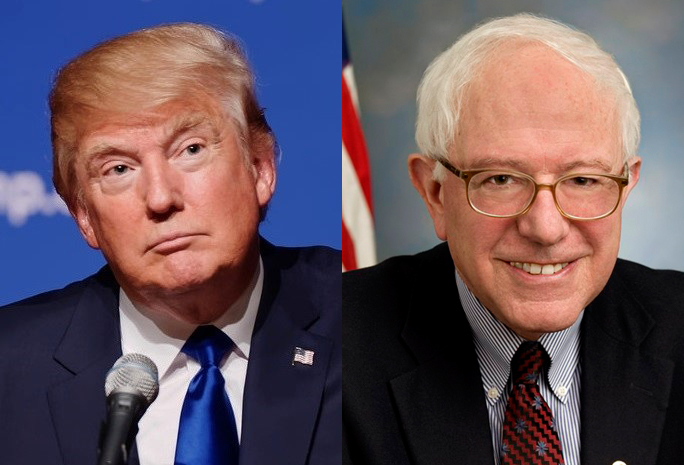
There seems to be many ways for presidential candidates to pander to Jews. One might look to the 2012 election, during which Republican candidate Michele Bachmann said she loved Israel so much that she put aside her fiscally conservative values to join a utopian socialist kibbutz when she was eighteen. Donald Trump, however, seems to care slightly less about pandering to Jews.
Indeed, his recent speech to the Republican Jewish Coalition highlighted a number of borderline anti-Semitic tropes and stereotypes, met with (perhaps slightly uneasy) laughter. This isn’t the first time that Trump has played up his connection to Jewishness (like when he refers to the fact that one of his “favorite daughters” is Jewish) or made jabs at Jews in the guise of humor. These are some of the same comments that might be met with horror if a liberal candidate made them, but we continue to feel surprise and bemusement when made by arch-conservative political talking heads like Ann Coulter and Donald Trump.
We see a very different portrayal of Jewishness in the Democratic Party’s Jewish candidate, Bernie Sanders. Sanders, despite having been noted for his appearance as a Jewish grandfather and a persona that bears a striking resemblance to Larry David, brings up the fact that he is Jewish very infrequently. Indeed, even when it’s discussed humorously — like in the Saturday Night Live skit — it goes nowhere near the anti-Semitic humor of Donald Trump, not only because Sanders’ caricature is played by a Jewish comedian. Trump, by comparison, is a non-Jew looking to capitalize on antiquated stereotypes for his own political gain.
When Sanders does elect to bring up his Jewishness, however, he doesn’t use it as a way to discuss some of the socioeconomic privileges that being Jewish comes with in America today which Trump did when he said that he didn’t want Jewish money in his meeting with the Republican Jewish Coalition last week Instead, Sanders uses it as backstory for why he advocates for racial and economic justice, as when asked by a Black Muslim student at George Mason University about how he’d respond to some of the racist rhetoric coming from Republican candidates. Because his father’s family was killed in the Holocaust , he said, he now fights for racial justice as a politician and as a candidate.
While Trump uses Jewishness as rhetoric disguised as humor to dehumanize Jewish voters and reduce them — including his daughter — to antiquated, offensive stereotypes as a means of political gain, Sanders is mobilizing his Jewish identity to effect change. Indeed, the fact that a Republican candidate who is leading in the polls can make such offensive comments — not just about Jews, but so many other minorities — and get away with it, and not only that but be praised as unpolished and fresh, should give us pause and force us to question how we got here in the first place. How did we get to a point when Jewishness can be used rhetoric for political gain in American politics? Worse, when did offensive Jewish rhetoric become so acceptable?
Susan Sager, a longtime Jewish Republican who attended the RJC forum, noted that she finds Trump’s quips both amusing and frightening, and this should also give us pause: Since when has it become acceptable to use offensive Jewish stereotypes as bait for politics, especially when they are perpetuated by non-Jews and being told to Jews?
Our Jewishness cannot and should not be used as a joke, especially when used by non-Jews, and especially when used as a way to score political points and pander to voters. The fact that we as a country have created a system which allows a candidate like Trump to lead in the polls points not just to Trump’s shortcomings as a person: It points to the fact that we, as a country, have failed in our political system by letting it get so far that we find jokes about ourselves amusing. This is further underscored by the way Sanders, who is actually Jewish, is highly selective about the way he uses his Jewishness as a rhetoric for political gain: He uses it not as a way to pander to voters, but as the basis for his political policies. Sanders doesn’t capitalize on his Jewishness for political gain. This is an important distinction, given that Trump has previously called for Muslims to carry public identification cards stating their religion, and recently announced that he wants to end all Muslim immigration to the United States if elected president.
Our Jewishness is not a rhetorical point, a joke to be made by politicians — and given the way that Trump discusses other minorities, we should be worried about the comments he directs at us as well. If Jewishness must be a rhetoric used by politicians, then it should be used productively, to inform our political stances and actions. If we find Trump’s reliance on hurtful and antiquated stereotypes to be funny, then we are part of why it’s acceptable for our presidential candidates to be openly racist and homophobic, and reproduce harmful stereotypes about minorities in our country. If we remain silent against Trump’s hate-filled vitriol, then we become complicit in the xenophobia that Trump is only amplifying.
Amram Altzman is a student at List College.

